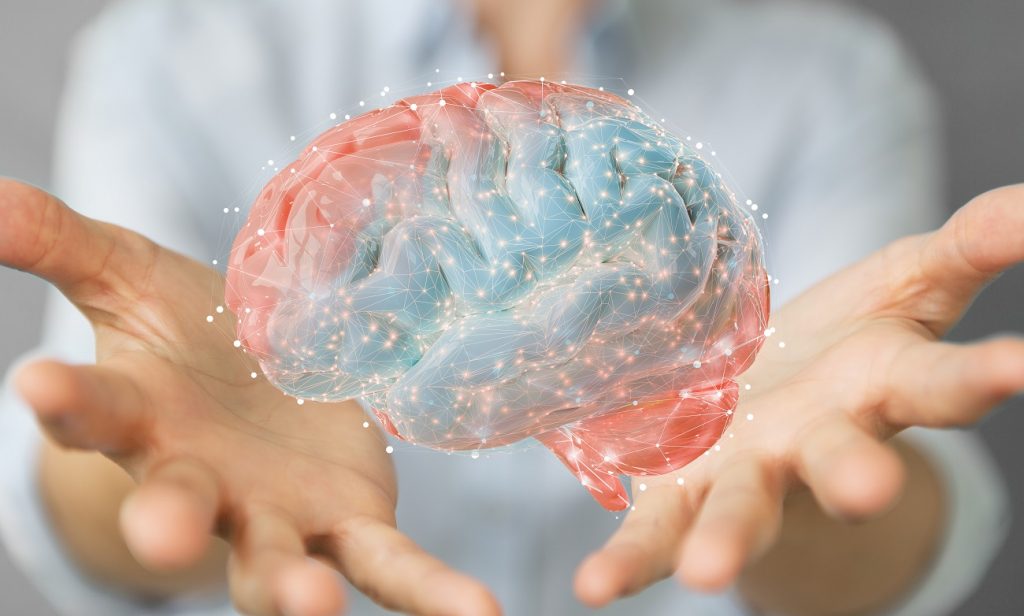Brain reorganization
The brain can reorganize after suffering damage. Which ability the patient loses after a stroke, depends on where and how large the damage is. Specifically for language, people often are not at all or hardly able to communicate immediately after a stroke. Thanks to the brain’s flexibility, they can recover their abilities within weeks or even days. In fact, the biggest improvements in language functions often happen within the first couple of days after the stroke incident and are mostly limited to the first six months post-stroke.
To get an impression of these kind of language difficulties, look at this video by a teenage stroke survivor.
But, how do people recover language abilities if the brain areas that supported these functions are damaged? There are different answers to this question based on different theories and mechanisms of underlying reorganization processes. Brain functions can either relocate near the damage, or as far as to the other side of the brain. Studies with aphasic patients have provided evidence for both possibilities. Which mechanism is used, depends on many individual factors. The results differ from person to person, and are difficult to generalize because of this.
The clinical side
The most difficult aspect of diagnosis is predicting patient outcomes. To what extent can patients “be themselves” again after suffering brain damage? Currently, clinicians struggle answering this question, and in most cases it is simply unknown. This makes it difficult to give patients realistic goals to work towards, as clinicians cannot predict the end result or how long it will take to get there. How much hope do you give or take from someone who has just suffered a stroke? This causes uncertainty and possible disappointment. Recovery after brain damage often takes several years with frequent setbacks, regardless of the level of impairment. In such cases, experts replying ‘we don’t know, just keep going’ can be discouraging. Being able to give more clarity and insight into what the recovery path looks like is thus quite valuable.
Patients can continue improving for quite some time, but the improvements will get smaller with time. Full recovery is almost impossible if it has not happened after the first year. “Any improvements in terms of communicating are major steps, but in terms of ‘am I going to be the person that I used to be’ they are tiny”, says Willemijn Doedens, a clinical language scientist and speech and language therapist. “It becomes quite a mixed bag of things that are difficult, and it is quite a muddy image.”
Future Outlook
Overall, the aim is to decrease this uncertainty to better direct what kind of treatment patients should receive. Better insight into whether someone can retrain or recover certain abilities would help guide treatment decisions. For example, if someone has very slim chances of recovering, they can save time and effort by focusing on ways to compensate for their disabilities.
“We are very good at understanding and training impairment-based things, but assessing, understanding, and treating at the level of communication is much more difficult, because it is more difficult to grasp and less controlled.” There can be a big difference between how a patient performs in the clinical tests and their actual language use. In real-life conversation there is less time and more distractions than during tests. “In a really time-pressured train station situation with noise, saying that same particular word they used in the clinic is a different thing.” That is why communication refers to all possible skills to express oneself in daily life. If patients are creative and able to use alternative ways of communicating, such as smartphones or aphasia communication booklets, this usually improves their communication abilities.
So, how much insight can research give us when it comes to helping aphasia patients? Big patient datasets will likely provide some answers, but probably not on the individual level. Furthermore, research on brain reorganization might tell us which mechanisms affect recovery after stroke. This knowledge could be used for brain stimulation to suppress hindering mechanisms of reorganization and boost helpful ones. This is quite a lot of information! So it remains crucial to keep studying the ways in which patients recover language after stroke, ideally using a mixture of different methods to get the full picture.
Writer: Natascha Roos
Editors: Candice Frances, Sophie Slaats
Translators: Julia von der Fuhr, Bianca Thomsen

